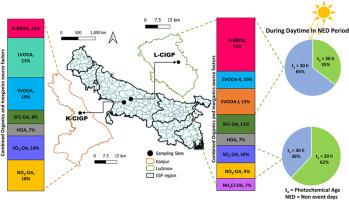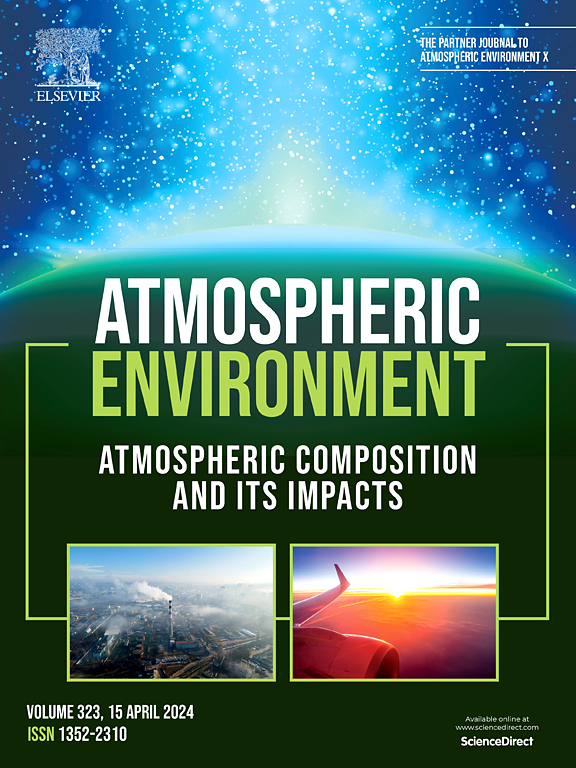印度河平原中部城市冬季综合 PM2.5 比较分析:有机和无机源的综合分配和特征描述,重点关注光化学年龄对二次有机气溶胶形成的影响
IF 3.7
2区 环境科学与生态学
Q2 ENVIRONMENTAL SCIENCES
引用次数: 0
摘要
为了深入了解空气质量动态,我们使用高分辨率飞行时间气溶胶质谱仪(HR-ToF-AMS)等高端仪器和空气热量计来测量勒克瑙和坎普尔冬季的复合 PM2.5(C-PM2.5)。它包括非折射性 PM2.5(NR-PM2.5)和黑碳(BC)的质量浓度。两个地点的 C-PM2.5 平均浓度存在显著差异,勒克瑙为 168.8 ± 61.3 μg m-3,坎普尔为 90.7 ± 25.7 μg m-3。有机物是主要成分,占 C-PM2.5 质量的 55% 至 65%,其次是无机物(24% 和 30%)和 BC(20% 和 8%)。本研究采用正矩阵因子法(PMF)对有机和无机源进行综合分配,分别解决了勒克瑙和坎普尔的 8 个和 7 个源因子问题。这两个地点的固体燃料燃烧有机气溶胶(SFC-OA)贡献都很大,勒克瑙为 11%,坎普尔为 8%。然而,勒克瑙的 SFC-OA 质量浓度为 24.67 μg m-³,几乎是坎普尔(12.05 μg m-³)的两倍。这可能是由于附近家庭的燃煤、无管制的露天焚烧和路边的垃圾焚烧造成的。研究表明,这两个地点都受到氧化生物质燃烧 OA(O-BBOA)排放的影响,由于 NO3 自由基的暗氧化作用,夜间浓度增加。二次有机气溶胶(SOA),如 O-BBOA 和半挥发性含氧 OA(SVOOA)的昼夜变化显示,白天浓度增加。因此,分析了光化学老化(ta)在 SOA 形成中的作用,结果表明 SOA 的形成可能主要由光化学氧化作用驱动。此外,两个地点的硫酸盐和硝酸盐相关 OA(SO4-OA 和 NO3-OA)以及勒克瑙的氯化铵相关 OA(NH4Cl-OA)这两个富含无机物的因素也得到了解决。我们的研究表明,由于冬季相对湿度高,NO3-OA 和 SO4-OA 的形成主要是水相过程,而且浓度随着 ta 的增加(ta > 30 小时)而下降。本文章由计算机程序翻译,如有差异,请以英文原文为准。

Comparative analysis of winter composite-PM2.5 in Central Indo Gangetic Plain cities: Combined organic and inorganic source apportionment and characterization, with a focus on the photochemical age effect on secondary organic aerosol formation
To gain insights into air quality dynamics, a high-end instrument such as High-Resolution Time-of-Flight Aerosol Mass Spectrometer (HR-ToF-AMS) alongside an Aethalometer was used to measure the Composite PM2.5 (C-PM2.5) in Lucknow and Kanpur during winter. It encompasses non-refractive PM2.5 (NR-PM2.5) and Black Carbon (BC) mass concentrations. Significant variation was noted in average C-PM2.5 concentrations at both sites, as 168.8 ± 61.3 μg m−3 in Lucknow and 90.7 ± 25.7 μg m−3 in Kanpur. Organics emerged as the predominant component, constituting ∼55%–65% of the C-PM2.5 mass, followed by inorganics (24% and 30%) and BC (20% and 8%). The present study employs Positive Matrix Factorization (PMF) on combined organic and inorganic source apportionment, resolving eight and seven source factors at Lucknow and Kanpur, respectively. Both sites exhibit significant contributions from solid-fuel combustion organic aerosol (SFC-OA), with ∼11% in Lucknow and 8% in Kanpur. However, SFC-OA mass concentration in Lucknow, at 24.67 μg m-³, is nearly double that in Kanpur (12.05 μg m-³). This was likely due to domestic coal burning in the nearby households, unregulated open burning, and burning of garbage on roadsides. The study shows that both sites were affected by oxidized biomass burning OA (O-BBOA) emissions, with increased concentration during the night due to dark oxidation by NO3 radicals. The diurnal variation of secondary organic aerosols (SOA), such as O-BBOA and semi-volatile oxygenated OA (SVOOA), shows increasing concentration during daytime hours. Therefore, the photochemical aging (ta) role in SOA formation was analyzed, and it was revealed that the formation might primarily be driven by photochemical oxidation. Additionally, two inorganic-rich factors, sulfate and nitrate-related OA (SO4-OA and NO3-OA) at both sites and additional ammonium chloride-related OA (NH4Cl-OA) resolved at Lucknow. Our study shows that NO3-OA and SO4-OA formation was dominated by aqueous phase processes due to high relative humidity and decline in concentration with increasing ta (ta > 30 h) during winter.
求助全文
通过发布文献求助,成功后即可免费获取论文全文。
去求助
来源期刊

Atmospheric Environment
环境科学-环境科学
CiteScore
9.40
自引率
8.00%
发文量
458
审稿时长
53 days
期刊介绍:
Atmospheric Environment has an open access mirror journal Atmospheric Environment: X, sharing the same aims and scope, editorial team, submission system and rigorous peer review.
Atmospheric Environment is the international journal for scientists in different disciplines related to atmospheric composition and its impacts. The journal publishes scientific articles with atmospheric relevance of emissions and depositions of gaseous and particulate compounds, chemical processes and physical effects in the atmosphere, as well as impacts of the changing atmospheric composition on human health, air quality, climate change, and ecosystems.
 求助内容:
求助内容: 应助结果提醒方式:
应助结果提醒方式:


